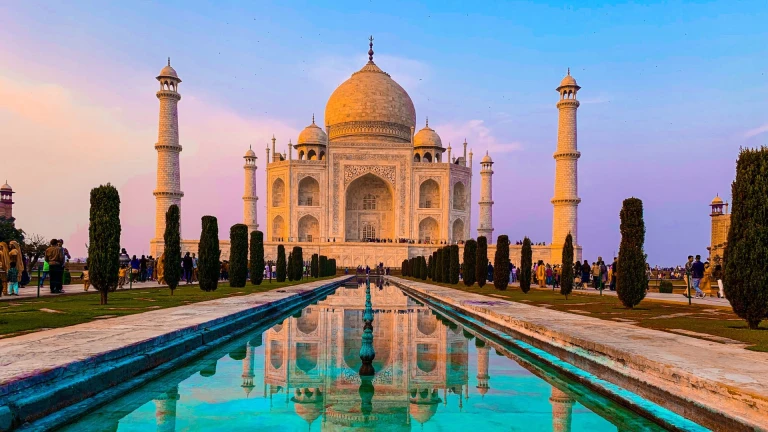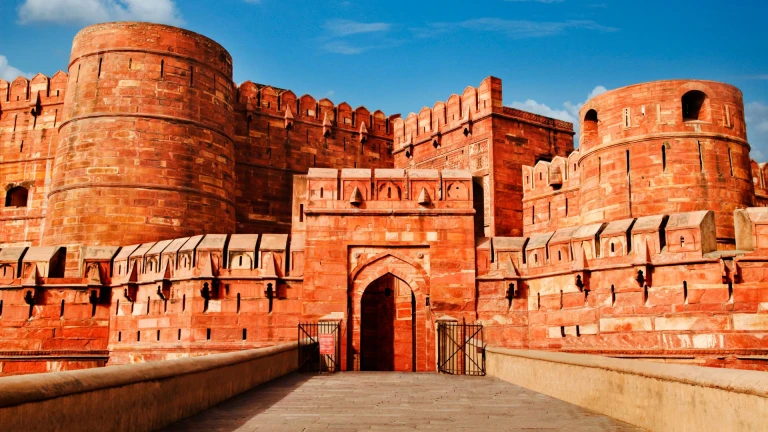Best and Worst Time to Visit the Taj Mahal
The Taj Mahal, a monument synonymous with love and architectural brilliance, beckons travelers worldwide. But with its grandeur comes the question: when is the best (and worst) time to visit this iconic landmark? Fear not, for this comprehensive guide will navigate the seasons of Agra, the city housing the Taj Mahal, unraveling the ideal time for your dream encounter with this architectural marvel.
Also Read: 2023 Ultimate Guide to Visiting the Taj Mahal

Unveiling Agra's Seasons: A Tapestry of Weather
Agra experiences three distinct seasons, each impacting your Taj Mahal experience:
Winter (October to March): This is widely considered the golden period for visiting the Taj Mahal. The weather is pleasant, with temperatures ranging from 15°C to 27°C (59°F to 81°F). Clear skies, low humidity, and gentle breezes make sightseeing a delight.
Summer (April to June): The scorching summer sun descends upon Agra, with temperatures soaring up to 45°C (113°F). While the heat can be daunting, the crowds are thinner compared to the peak season.
Monsoon (July to September): The monsoon brings much-needed respite from the summer heat. However, heavy downpours and occasional disruptions in travel can pose challenges.
Winter Wonderland (October to March): Best Time to Visit
Winter offers the perfect setting to witness the Taj Mahal's captivating beauty:
Pleasant Exploration: The comfortable temperatures allow you to explore the intricate details of the monument without the sweltering summer heat hindering your experience.
Golden Hour Magic: Winter mornings and evenings boast stunning golden light, bathing the Taj Mahal in a warm glow, perfect for capturing breathtaking photographs.
Festive Delights: Agra comes alive during winter with vibrant festivals like Diwali, adding a touch of cultural immersion to your trip.
Things to Consider:
Peak Season Crowds: Winter is the busiest tourist season. Expect higher prices and more crowds, especially during holidays. Booking tickets and accommodation in advance is essential.
Foggy Mornings: While rare, Agra can experience occasional morning fog during winter. This might temporarily obscure the Taj Mahal's view.
Summer Siesta (April to June): A Time for Patience and Planning (aka Worst Time to Visit)
While the summer heat might deter some, strategic planning can make your Taj Mahal visit in the summer worthwhile:
Thinner Crowds: Summer offers a chance to experience the Taj Mahal with fewer crowds, especially during weekdays.
Exploring Beyond the Taj: The scorching sun might limit sightseeing time, but you can explore Agra's other historical sites like Agra Fort or Itmad-ud-Daulah's tomb during cooler mornings and evenings.
Things to Consider:
The Scorching Heat: Be prepared for the intense heat with proper hydration, sunscreen, and light, breathable clothing.
Limited Outdoor Activities: The extreme heat might limit outdoor activities and exploration, so plan your itinerary accordingly.
Monsoon Majesty (July to September): Unveiling a Different Agra
The monsoon season, often overlooked, offers a unique perspective on Agra and the Taj Mahal:
Lush Landscapes: The relentless rains transform Agra's arid landscape into a verdant paradise. Witness the surrounding gardens teeming with life and the Yamuna River in full flow.
Monsoon Discounts: Hotels might offer discounts during the monsoon, making it a budget-friendly travel option.
Things to Consider:
Heavy Rainfall: Monsoon rains can disrupt travel plans and cause occasional closures of the monument. Be flexible with your itinerary and pack rain gear.
Limited Visibility: Heavy downpours can sometimes restrict clear views of the Taj Mahal.
Beyond the Seasons: Tailoring Your Taj Mahal Trip
The ideal time to visit the Taj Mahal ultimately depends on your preferences:
For Pleasant Weather and Sightseeing: Winter (October to March) is the clear winner.
For Budget Travel and Fewer Crowds: Consider the shoulder seasons (September-October and April-May). However, be prepared for slightly unpredictable weather.
For Photographers: Winter mornings and evenings offer the best lighting for capturing stunning photos of the Taj Mahal.
Beyond the Weather: Unveiling Agra's Treasures
Agra offers more than just the Taj Mahal. Here are some other experiences to consider:
Agra Fort: Explore the majestic Agra Fort, a UNESCO World Heritage Site, and delve into Mughal history.
Itmad-ud-Daulah's Tomb: Also known as the "Baby Taj," this smaller tomb offers a glimpse into Mughal architectural techniques.
Mehtab Bagh: Enjoy a serene sunset view of the Taj Mahal from Mehtab Bagh, a Mughal-era garden complex offering a unique perspective of the monument.
Jama Masjid: Witness the architectural grandeur of Jama Masjid, one of the largest mosques in India.
Sadar Bazaar: Immerse yourself in the vibrant atmosphere of Sadar Bazaar, a bustling marketplace known for its handicrafts and souvenirs.

Planning Your Taj Mahal Trip: Tips and Tricks
Here are some additional tips to ensure a smooth and enriching experience in Agra:
Book Tickets in Advance: Especially during peak season (winter) and around holidays, booking tickets for the Taj Mahal online well in advance is crucial.
Choose the Right Time of Day: Early mornings or late afternoons offer the most pleasant temperatures and potentially fewer crowds for your visit.
Respect Local Customs: Dress modestly when visiting religious sites like the Taj Mahal and Agra Fort. Be mindful of local customs and traditions.
Beware of Touts: Touts might approach you near the Taj Mahal. Be polite but firm in declining unsolicited services.
Hire a Reputable Guide: Consider hiring a knowledgeable guide to enhance your understanding of the Taj Mahal's history and architecture.
Explore Beyond Agra: Extend your trip to explore nearby destinations like Jaipur, the "Pink City," or Delhi, the capital of India.
Also Read: What to Expect When Travelling to India: Expectations vs Reality
Unveiling the Timeless Beauty: A Journey Beyond Seasons
The Taj Mahal transcends seasons, captivating visitors year-round. By understanding the unique offerings of each season and tailoring your trip to your preferences, you can create a memorable encounter with this architectural marvel. Whether you seek comfortable sightseeing weather or a budget-friendly experience, Agra and the Taj Mahal offer a timeless experience waiting to be unveiled.
Published at
About Author
Manya Shastry
Subscribe our Newsletter
Get our weekly tips and travel news!
Related Posts
10 Amazing New Attractions in Singapore - Indian Travelers Guide 2025
Explore the new yet amazing attractions of Singapore
10 Best Beach Resorts in Karwar Karnataka - 2024
Escape to the tranquil beaches of Karwar, Karnataka, where luxury resorts offer a serene retreat amidst nature's pristine beauty.
10 Best Places to Visit in Mahabalipuram, Tamil Nadu
Explore the 10 Best Places to Visit in Mahabalipuram, Tamil Nadu – where ancient temples, rock-cut sculptures, and serene beaches meet!
10 Common Mistakes Every Traveler Makes
Indian travelers often overpack, skip travel insurance, and neglect local customs. Embrace light packing, smart planning, and cultural respect for a smooth and unforgettable trip.
10 Cool Summer International Destinations
Beat the Indian heat with these 10 cool summer international destinations that promise refreshing getaways and unforgettable experiences.
Latest Posts
India Cuts Foreign Travel Tax to 2%: Bali, Oman, Thailand Just Got More Affordable
Planning that dream vacation to Bali or Oman? Here's great news from Budget 2026—the government just slashed the tax on foreign tour packages from a painful 20% to just 2%. Your overseas holiday just became a lot easier on the wallet.
India's New Baggage Rules 2026: Higher Duty-Free Limits Explained
Good news for international travelers! India just made customs clearance easier with the new Baggage Rules 2026, effective February 2. You can now bring more stuff home duty-free, and the whole process is going digital.
5 Instagram-Worthy Places in India Under ₹10,000 – Budget Travel Guide for 2026
Looking for aesthetic budget trips? Explore Instagram-worthy places in India under ₹10,000 with travel tips, best photo spots & ideal seasons for 2026.
7 Safest Places for Solo Female Travelers in India in 2026
Explore the 7 safest, most vibrant Indian spots for solo female travelers in 2026, from Himalayan peaks to coastal escapes.
Europe's tourism landscape is experiencing dramatic transformations in 2026, with Portugal, Spain, Italy, Bulgaria, and the UK dominating international headlines through record-breaking growth, revolutionary travel systems, and strict new regulations resh

